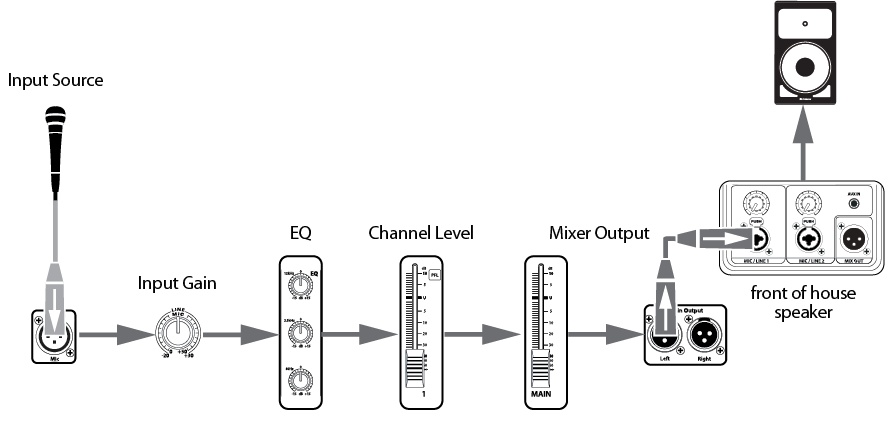
We all like to pretend that sound is a dark art that only a few chosen ones have chosen to understand and practice. However, this dark art is actually not just for the few chosen ones, even if you do not want to practice it full time it is useful for you to know about.
Sound is physics, we can all agree on that. But you do not have to be good at math or be a ‘techy person’ to understand the basics of sound. To understand sound, all you need is a bit of common sense. Being able to work out how A is connected to B, that is it!
A sound is caused by vibration, the air particles called molecules close to an object vibrate.
Sound needs a medium to travel through – through air, metal or water.
An object transmits the sound, our ears are the receivers.
The vibrating air reaches our eardrum, which then transmits the vibrations to the small bones in our middle ear.
When it reaches our inner ear, the oscillating pressures are converted into electrical signals and sent to the brain.
Easy right? It is not more complicated than that! Sound comes from A. The object which transmits it to B, our ears.

We like to think that things are more complicated than they actually are. But with all things tech, a human has designed and invented it. So if we stop ourselves for a minute and go ‘hang on, what would the most logical solution be?’ you’ll find yourself knowing the answer. All things tech have a signal flow, and that is what you need to figure out. How to connect the A to B.
When we amplify sound, it works in a similar way. But rather than transmitting the sound over just air, we transmit it via microphones & cables, i.e., metal! We transmit the sound from the stage to the receiver, which will be the mixing desk. From the mixing desk, it goes out to the speakers, which transmit the sound to our ears in the audience. That is a simple signal flow.
Why is it good to know about the signal flow? If you regularly perform live or record at home or in studios, how many times have you encountered issues? I’d say that every session or live gig has technical issues that usually come down to signal flow. You’ll solve things quicker if you know what might cause the issue by tracing the signal flow.
It surprises me that a lot of the musicians and artists that come my way have very little knowledge about their sound and how it is being produced, but more importantly, how they want it to sound to other people.
The only instrument I know how to play is the piano. But I have the knowledge of how I want drums to sound, how to reskin them and how to tune them. Perhaps it has been an advantage of having worked with so many drum kits. I know what a good kit sounds like, but more importantly what a bad kit sounds like!
Like breathing, we often forget that we are doing it. We just do! It is the same with actually listening and tuning in to something. Paying attention at a gig, what does it sound like? What is a good sound?
Be curious!
Ever thought about how something is done? Google it! Read and learn about it; knowledge is power!
As I mentioned with drum kits, I don’t play drums, but I was curious to know how it all works. What are the differences, why do they sound so different, why do they need so many cymbals etc etc.
As passionate as I am talking about sound, most full-time musicians will passionately talk about their instruments. They have perfected their skills and put so many hours into practice that finally they can tell somebody about it! Ask away!
Communication:
It goes both ways, as sound technicians or as musicians, knowing what sound you like makes it easier for you to start the conversation with each other. We shall always thrive on working as a team and not as separate entities; we need to be able to communicate with each other.
Article by SoundGirl: Olive Olin
Another great article by SoundGirls: Female Sound Engineer in Bollywood: Giving Up Was Not A Choice
Follow SoundGirls on Instagram, Twitter


The mission of SoundGirls.org is to inspire and empower the next generation of women in audio. Our mission is to create a supportive community for women in audio and music production, providing the tools, knowledge, and support to further their careers. SoundGirls.Org was formed in 2013 by veteran live sound engineers Karrie Keyes and Michelle Sabolchick Pettinato and operates under the Fiscal Sponsorship of The California Women’s Music Festival, a 501(c)3 non-profit organization. In 2012, Karrie and Michelle participated in the “Women of Professional Concert Sound” panel at the AES Conference in San Francisco. The panel was hosted by the Women’s Audio Mission (WAM) and moderated by WAM founder Terri Winston. Terri brought together five women working in live and broadcast audio. The groundbreaking panel (which also included Jeri Palumbo, Claudia Engelhart and Deanne Franklin), provided young women and men a glimpse into life on the road, tips and advice, and a Q & A with the panelists. More importantly though, was how incredibly powerful the experience was for the panelists. We had all been in the business for 20 years or more, yet most of us had never met before that day and within minutes we bonded like long-lost sisters. We were struck by how similar our experiences, work ethics, and passions were and wondered why our paths had never crossed and how our careers would have been different had we been there to support each other through the years. Each of us are strong on our own, but together we were even stronger and a powerful force. We were empowered. Each of us had been asked hundreds of times in our careers: Are there other women doing sound? How did you get into sound? How would a young woman go about getting into sound? Through creating SoundGirls.Org, we hope to establish a place for women working in professional audio to come for support and advice, to share our success and failures, our joys and frustrations, and for empowerment and inspiration.
Read Full Profile© 2021 TheatreArtLife. All rights reserved.

Thank you so much for reading, but you have now reached your free article limit for this month.
Our contributors are currently writing more articles for you to enjoy.
To keep reading, all you have to do is become a subscriber and then you can read unlimited articles anytime.
Your investment will help us continue to ignite connections across the globe in live entertainment and build this community for industry professionals.